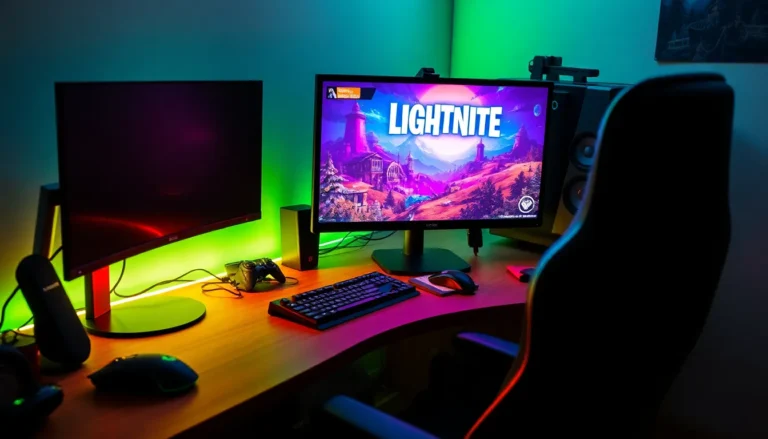Table of Contents
ToggleIn the fast-paced world of coding, having the right laptop can mean the difference between a smooth sailing experience and a frustrating battle with lag. Picture this: you’re deep in the zone, crafting the next big app, when suddenly your laptop decides to take a coffee break. Not cool! A reliable laptop isn’t just a luxury; it’s a necessity for every coder.
Best Laptops for Coding
Selecting the right laptop for coding involves considering performance, portability, and price. Apple’s MacBook Pro 16 offers exceptional performance with its M1 Pro chip, providing speed and efficiency for programming tasks. Dell XPS 13 stands out for its compact design and high-resolution display, making it ideal for developers who travel frequently.
Lenovo ThinkPad X1 Carbon remains a top choice due to its robust build quality and exceptional keyboard comfort, catering to those who spend hours coding. Microsoft Surface Laptop 4 features a touchscreen and sleek design, appealing to users who appreciate versatility in their devices.
Asus ROG Zephyrus G14 combines powerful hardware with a lightweight chassis, suitable for game developers needing high graphics performance. HP Spectre x360 14 integrates functionality with a 2-in-1 design, allowing users to switch between laptop and tablet modes effortlessly.
For budget-conscious coders, Acer Aspire 5 provides great performance with its Ryzen 5 processor, delivering excellent value. Apple’s MacBook Air, powered by the M1 chip, remains a popular choice for its balance of portability and power.
Investing in a laptop with at least 16GB of RAM and an SSD ensures that it can handle multiple applications and tasks simultaneously. A high-resolution display enhances the visual experience, making coding easier on the eyes.
Finding a laptop tailored to specific coding requirements can significantly enhance productivity. Ultimately, each option listed addresses different needs, offering coders a range of choices to support their work effectively.
Key Features to Consider

Choosing the right laptop for coding involves evaluating several critical features that enhance performance and productivity.
Processor Performance
Processor performance plays a crucial role in coding efficiency. A powerful processor, such as the latest Intel Core or AMD Ryzen series, enables faster code compilation and execution. Multi-core processors handle multiple tasks simultaneously, which benefits developers using heavy integrated development environments. Selecting a laptop with at least a quad-core processor ensures responsiveness during resource-intensive tasks. Developers requiring optimal performance should consider models with higher clock speeds. The Apple M1 or M1 Pro chips offer strong alternatives for those in the Apple ecosystem.
RAM Requirements
RAM requirements significantly affect multitasking capabilities. A minimum of 16GB of RAM is recommended for coding, as this amount accommodates running virtual machines and large software applications smoothly. More demanding tasks or projects might benefit from 32GB or more. This additional memory prevents slowdowns when multiple applications are open. Developers working on complex software development projects should prioritize laptops that allow RAM upgrades for future-proofing purposes. Efficiency improves with adequate RAM, making coding tasks more manageable.
Storage Options
Storage options directly impact load times and data retrieval speed. Solid State Drives (SSDs) are preferred due to their faster read and write speeds compared to traditional Hard Disk Drives (HDDs). A laptop with at least 512GB of SSD storage ensures ample space for multiple projects and applications. Developers handling large files or working with extensive libraries may require 1TB SSD models. Laptops with M.2 NVMe SSDs provide even better performance. Consider models featuring dual-storage options to balance speed and capacity for optimal coding experiences.
Operating System Choices
Choosing the right operating system affects a coder’s experience. Different platforms offer distinct advantages tailored for programming.
Windows vs. Mac vs. Linux
Windows supports a vast range of software and tools, making it a popular choice among developers. Various IDEs and applications operate seamlessly on this OS. MacOS, known for its robust ecosystem, caters specifically to developers within the Apple ecosystem and excels in performance with tools like Xcode for iOS development.
Linux attracts those who prefer open-source solutions. Its flexibility and customization capabilities support a wide array of programming languages and environments. Many coding professionals enjoy using Linux for web development and server management. Each operating system serves a distinct purpose, and selecting one often depends on individual coding requirements and project demands.
Budget-Friendly Options
Several budget-friendly laptops cater to coders without sacrificing necessary performance. The Acer Aspire 5 stands out for its solid specifications at a lower price point. It features a decent Intel Core i5 processor along with 8GB of RAM, making it suitable for coding tasks.
Apple’s MacBook Air, known for its efficiency, offers the M1 chip that provides impressive performance while maintaining a lightweight design. Its long battery life supports extended work sessions without frequent charging interruptions.
Lenovo IdeaPad 3 also presents an affordable option. This laptop boasts an AMD Ryzen 5 processor and a backlit keyboard, which is helpful for late-night coding. Additionally, its ample storage options include SSD choices that enhance performance and loading times.
HP Pavilion x360 combines functionality with affordability, providing a 2-in-1 design that allows for flexibility in usage. This device includes a 14-inch touchscreen, which can be useful for debugging and testing applications.
Asus VivoBook 15 offers a compelling blend of performance and price. Equipped with an Intel Core i3 processor and 8GB of RAM, this laptop is excellent for entry-level coding tasks. Its lightweight frame makes it portable, catering to coders on the go.
Considering these options helps coders find devices that meet performance needs without breaking the bank. Selecting laptops with at least 8GB of RAM and SSD storage enhances productivity and coding experience, allowing for efficient multitasking while sticking to a budget.
High-End Laptops for Professionals
High-performance laptops are crucial for professionals engaged in coding. Apple’s MacBook Pro 16, featuring the M1 Pro chip, delivers exceptional processing power. With an impressive Retina display and up to 64GB of RAM, it excels in resource-intensive tasks.
Dell XPS 15 offers a sleek design and powerful specifications. Equipped with Intel’s latest processors, it supports graphics-intensive software, making it ideal for game development and software engineering. The 4K OLED display provides vivid visuals, enhancing the coding experience.
Lenovo ThinkPad X1 Carbon stands out for its robust build quality and comfortable keyboard. Known for its excellent keyboard layout, it contributes to an efficient coding workflow. Additionally, its long battery life ensures productivity without constant charging interruptions.
Another noteworthy option is the Microsoft Surface Laptop 4. This device combines portability with versatility, featuring Intel Core processors and a high-resolution touchscreen. It suits professionals who require a balance between work and travel.
For developers focused on gaming, Asus ROG Zephyrus G14 offers remarkable performance with AMD Ryzen processors and dedicated NVIDIA graphics. Its compact design makes it easy to carry, catering to gamers and coders alike.
HP Spectre x360 14 presents a flexible 2-in-1 design, allowing users to switch between laptop and tablet modes. The combination of powerful hardware and sleek aesthetics appeals to creative professionals.
Investing in a laptop with a minimum of 16GB of RAM and an SSD enhances multitasking capabilities. These specifications ensure efficient management of various tasks while maintaining overall system performance.
Choosing the right laptop for coding is crucial for maximizing productivity and enhancing the coding experience. A dependable device not only supports efficient multitasking but also minimizes frustration during development. With options ranging from high-performance machines like the Apple MacBook Pro 16 to budget-friendly choices like the Acer Aspire 5, coders have a variety of tools to suit their needs.
By considering essential features such as processor power, RAM, and storage, individuals can find a laptop that aligns with their coding requirements. Ultimately, investing in a quality laptop pays off in improved performance and a smoother workflow, empowering coders to focus on what they do best—creating and innovating.





